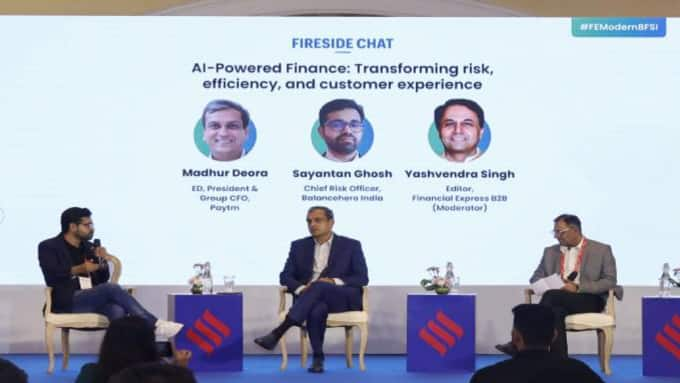At the recently held FE Modern BFSI Summit, Industry leaders discussed the ROI of AI projects, acknowledging that while the immediate impact of the technology may be intangible, its long-term value is undeniable.

Artificial Intelligence hasn’t reached full autonomy, observed Madhur Deora, ED, President & Group CFO of Paytm, at the Modern BFSI Summit organized by The Financial Express in Mumbai recently. He was expressing his views as a part of the panel discussion - ‘AI-Powered Finance: Transforming risk, efficiency, and customer experience’, Sayantan Ghosh, Chief Risk Officer, Balancehero India was the other BFSI leader in the panel, moderated by Yashvendra Singh, Editor, Financial Express B2B.
“Most AI systems today can still be understood. They’re not yet fully autonomous,” Deora said in response to a question on balancing AI with compliance. Instead of replacing human decision-making, AI is helping organisations better interpret data, especially in high-stakes functions like compliance, fraud detection, and credit risk.
Echoing this sentiment, Ghosh from Balancehero India, added that governance is still catching up to AI's capabilities. “We're past logistic regression models. Now we’re dealing with large language models. We need to reimagine what explainability and transparency mean in this context,” he said, stressing the importance of ethical AI for scaling adoption across enterprises.
Calculating ROI on AI
When it comes to evaluating AI’s return on investment, both panelists emphasised the importance of context. “AI shouldn’t be treated as a standalone project. It should make the entire organisation more efficient,” said Deora, citing Paytm’s 30,000-member field force. Even a modest 20% improvement in task allocation through AI could translate to hundreds of crores in savings, he pointed out.
Ghosh agreed, highlighting that ROI varies with each use case—from customer support to underwriting. “It’s about comparing the ‘before’ and ‘after’ using the right metrics.”
Deora added that AI investments often yield intangible benefits. “Think of reducing Uber wait times from 5 to 2 minutes. Can you directly measure the impact? Maybe not. But it changes customer expectations, and that shift itself has long-term value.”
Will AI poach Jobs?
On the question of AI-triggered job losses, Deora was clear: “There are two types of people—those who use AI and those who don’t. If you fear it, you’ll become obsolete. If you lean in, you’ll be AI-ready.”
He emphasised the need for experimentation and mindset change. Ghosh concurred, stating, “AI won’t take your job. It will make you better at your job—if you embrace the mindset.”
Drawing a parallel with fintech’s trajectory, Ghosh said the current AI wave resembles the early days of fintech in India. “Just like fintech didn’t replace banks but ended up coexisting with them, AI won’t disrupt for the sake of disruption—it will enable faster and more efficient scaling,” he said.
He gave examples from Balancehero India, which serves customers across 98% of India's pin codes. “We can’t hire agents fluent in every regional language. AI bots help us bridge that gap. In marketing, AI-generated content is now practically indistinguishable from human-created content. And in underwriting, AI enhances risk evaluation by combining digital footprints with traditional data.”
Democratising Intelligence in Finance
According to Deora, what’s remarkable about AI today is not its intelligence but its accessibility. “AI isn’t new. What’s new is the interface, which has made AI more democratic,” he noted.
For finance professionals, that means becoming multi-domain thinkers. “You don’t need to be an engineer to use AI. You just need to know how to ask the right questions,” he said.
Deora added that AI helps finance leaders in faster product development and sharper performance analysis. “Instead of asking, ‘What’s the problem?’—you let AI tell you if a problem even exists.”
Build vs Buy
The panel also tackled the ongoing “build versus buy” debate in AI implementation.
“Nobody’s building their own LLMs. We wrap them with our data and deploy them for specific use cases,” said Ghosh. According to him, for most companies, it’s about operationalising existing models rather than building them from scratch.
Deora offered a more hybrid view. “We use AI tools to build AI tools. For example, managing our vast datasets requires custom tools built with AI.” He advised businesses to start with first principles, assess what already works, and only then consider building from scratch. “Some tools built for customer service have turned out useful in finance too. There are efficiencies we uncover only when we start using them,” he added.
By continuing you agree to our Privacy Policy & Terms & Conditions
